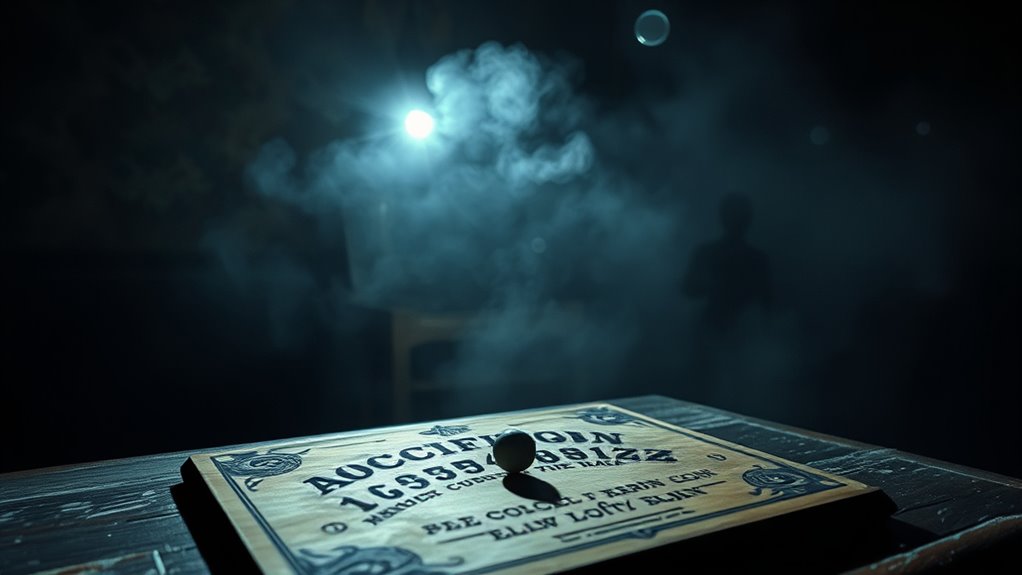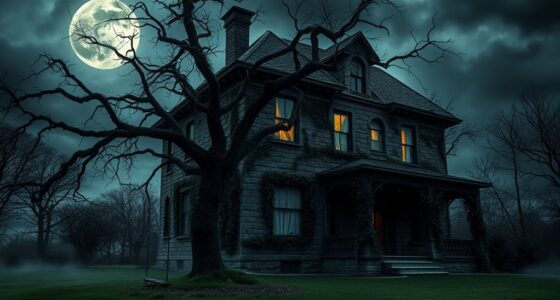Paranormal activity includes puzzling events that defy normal explanation, inviting you to explore the unknown. Many experience heightened emotions during these encounters, which can complicate perceptions. Risks like anxiety and fear often arise, especially for children. While beliefs in harmful spirits persist, there’s no scientific proof they can cause physical harm. If you’re curious about understanding these phenomena and the field of paranormal research, you’ll find even more intriguing insights ahead.
Key Takeaways
- Paranormal activity includes unexplained events, often influenced by emotional responses and misinterpretations of sensory perceptions.
- Intense emotions during encounters can lead to psychological effects, such as anxiety and sleep disturbances.
- Beliefs in harmful spirits lack scientific support; fear often drives misconceptions about supernatural threats.
- Professional therapy is essential for those struggling with emotional fallout from paranormal experiences, ensuring adequate support.
- Effective paranormal research employs tools like EMF meters, emphasizing skepticism and collaboration for accurate analysis.
What Defines Paranormal Activity?
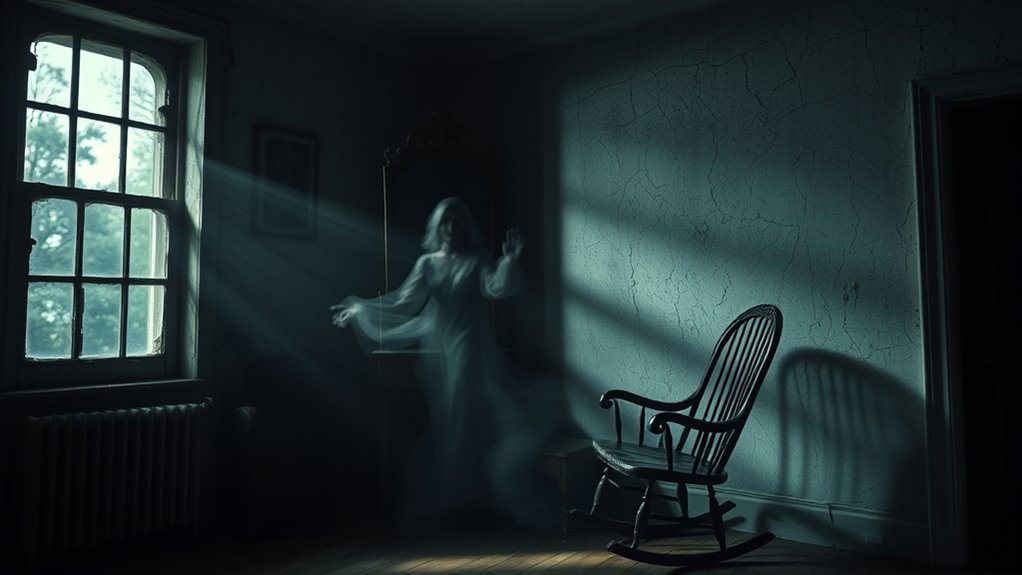
Paranormal activity refers to events that go beyond what we consider normal, often leaving us puzzled and searching for answers. This includes experiences like ghost sightings, where individuals report feelings or sensations that lack scientific explanation.
It’s important to keep an open mind when exploring these claims, as the absence of a known explanation doesn’t confirm the existence of supernatural entities. Often, people misinterpret their perceptions, leading to illusions or dreams that feel real.
Reliable scientific methods for detecting paranormal activity don’t exist, so it’s essential to prioritize natural explanations first. By examining these experiences critically, you can separate genuine feelings from mere misunderstandings, enhancing your understanding of what defines paranormal activity.
How Do People Experience Paranormal Phenomena?

When you think about how people experience paranormal phenomena, it often starts with sensory perceptions like chills or strange noises.
Emotional responses play a big role too, as these experiences can stir deep feelings of connection or fear.
Personal anecdotes add to the intrigue, revealing how unique each encounter can be.
Sensory Perceptions and Interpretations
How do you perceive the unknown? Your sensory experiences play an essential role in how you interpret paranormal phenomena.
Many people report feelings like sudden chills or warmth, which can often be influenced by psychological factors such as fear or stress. These emotions heighten your awareness, making you more likely to misinterpret normal stimuli as supernatural. Furthermore, emotional damage from unresolved personal issues can amplify these sensations, leading to heightened experiences of the unknown. Additionally, many individuals seek comfort in the notion of the supernatural realm, as it offers explanations for their fears and uncertainties. Understanding the patterns of narcissistic behaviors can also shed light on how personal relationships may influence these perceptions. Recognizing the importance of communication in relationships can help you better navigate emotional turmoil and its effects on your perceptions.
Visual perceptions, like seeing shadowy figures, can also be misleading; your brain might confuse low light or fatigue for something otherworldly.
Additionally, auditory anomalies—like disembodied voices—might stem from environmental factors rather than true paranormal activity.
Often, these experiences occur during emotionally charged moments, making it easy to connect them with the supernatural. Understanding these elements can help clarify what you’re truly experiencing. Furthermore, these sensations can sometimes be linked to your subconscious processing of daily interactions, similar to how recurring dreams of a partner reflect strong emotional connections.
Psychological and Emotional Responses
Many individuals find themselves grappling with intense emotions during supposed paranormal experiences, often leading to heightened psychological responses. Fear or panic can trigger stress-related conditions, like sleep paralysis, where you might see frightening figures while awake. Children, in particular, may confuse real and imagined threats, leading to fears tied to their imaginations.
| Emotional Response | Psychological Impact |
|---|---|
| Fear of the unknown | Heightened anxiety |
| Comfort from messages | Reduced grief |
| Misinterpretation of sensations | Illusions of activity |
These emotional connections, especially to deceased loved ones, can provide comfort. However, misinterpretation of sensory perceptions can also create illusions, causing you to believe you’ve encountered something paranormal when it’s a psychological response to fear. Understanding the role of emotional instability in these experiences can provide further insight into the complexities of how individuals react to perceived paranormal phenomena.
Personal Anecdotes and Experiences
Paranormal experiences often manifest in deeply personal ways, shaped by individual emotions and beliefs. You might hear disembodied voices or sense a ghostly child’s presence in your home, evoking feelings that range from comfort to unease.
Many people report receiving messages from deceased loved ones during emotionally charged moments, making these encounters even more poignant. You may also find yourself seeing things like shadowy figures or noticing objects mysteriously moving.
Children, in particular, sometimes have unique sensitivities, often describing imaginary friends that may be more than just figments of their imagination.
Shared experiences, like bed shaking or nighttime disturbances, highlight how these phenomena can affect entire families, bonding them through the mysterious and unexplained.
Are There Risks Associated With Paranormal Encounters?
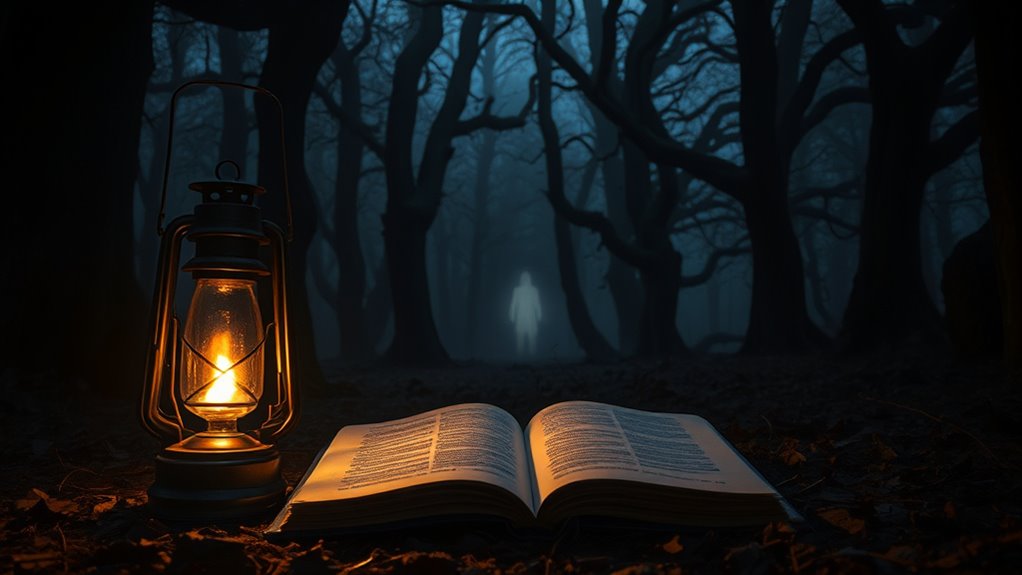
When you encounter paranormal phenomena, the psychological effects can be profound, often leading to fear or anxiety that impacts your daily life.
You might even find yourself in situations that challenge your physical safety, especially if you turn to extreme measures out of desperation.
It’s important to recognize these risks and seek help when needed.
Psychological Effects and Fear
How can a simple encounter with the unknown lead to lasting psychological effects? Intense fear during paranormal encounters can trigger psychological distress, leaving you anxious and struggling with sleep disturbances.
If you’re a child, these fears can become particularly overwhelming, as you may find it hard to distinguish between real threats and imagined monsters.
Paranormal investigators often report that such experiences can lead to panic attacks or even self-harm in extreme cases.
Sleep paralysis can further complicate things, causing you to misinterpret dream-like states as encounters with supernatural beings.
It’s essential to address these fears critically, and professional therapy can help you manage the emotional fallout, guiding you in coping with the lasting impacts of your experiences.
Physical Safety Concerns
Encounters with the unknown can stir intense emotions, but it’s important to contemplate the actual physical risks involved.
While there’s no scientific evidence that spirits or paranormal entities can cause physical harm, the psychological impact can be significant. Intense fear during paranormal encounters might lead to psychological distress or even self-harm, underscoring the need for mental well-being.
Misinterpreting sleep paralysis as a paranormal event can also exacerbate anxiety, making professional help essential. Additionally, belief in harmful spirits could prompt dangerous interventions, like exorcisms, with real-world consequences.
To minimize risks during investigations, maintain a respectful attitude and set proper boundaries. By doing so, you can navigate these experiences more safely and with a clearer mind.
Can Spirits Inflict Harm?
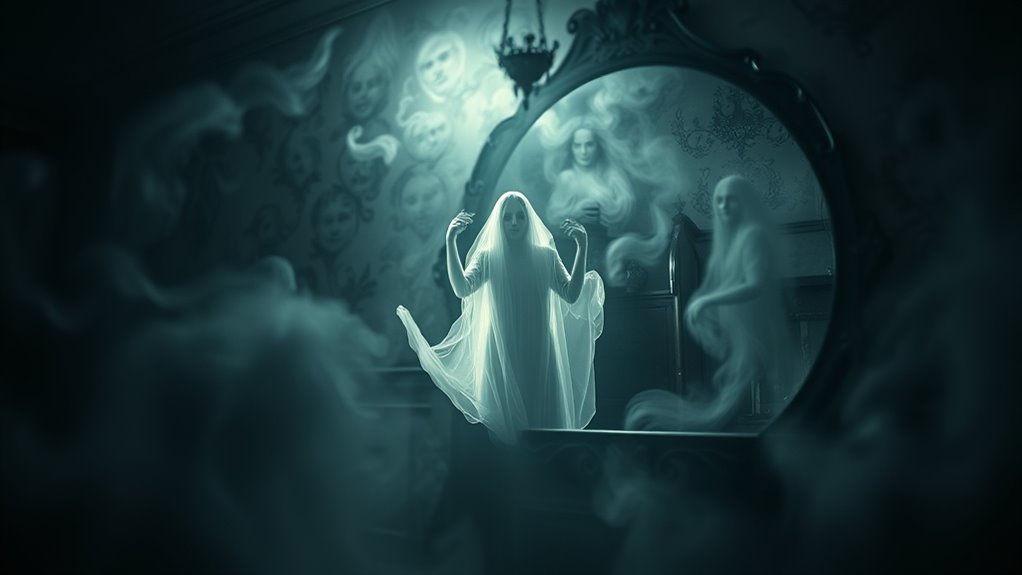
Spirits can truly inflict harm, or are such beliefs merely products of our imagination? While many fear malevolent spirits, there’s no scientific evidence to support the idea that they can cause physical harm.
Historical events, like the Salem witch trials, show how the belief in harmful spirits can lead to dangerous outcomes. Often, reports of harm stem from psychological factors, such as panic or stress during intense paranormal experiences.
The Salem witch trials exemplify how fears of harmful spirits can provoke dangerous and irrational reactions.
This fear can result in harmful interventions, like exorcisms, which may worsen mental distress. By understanding the nature of fear and anxiety, you can cope with these experiences without attributing harm to unseen entities.
It’s crucial to differentiate between psychological responses and the idea of harmful spirits.
Why Pursue a Career in Paranormal Research?
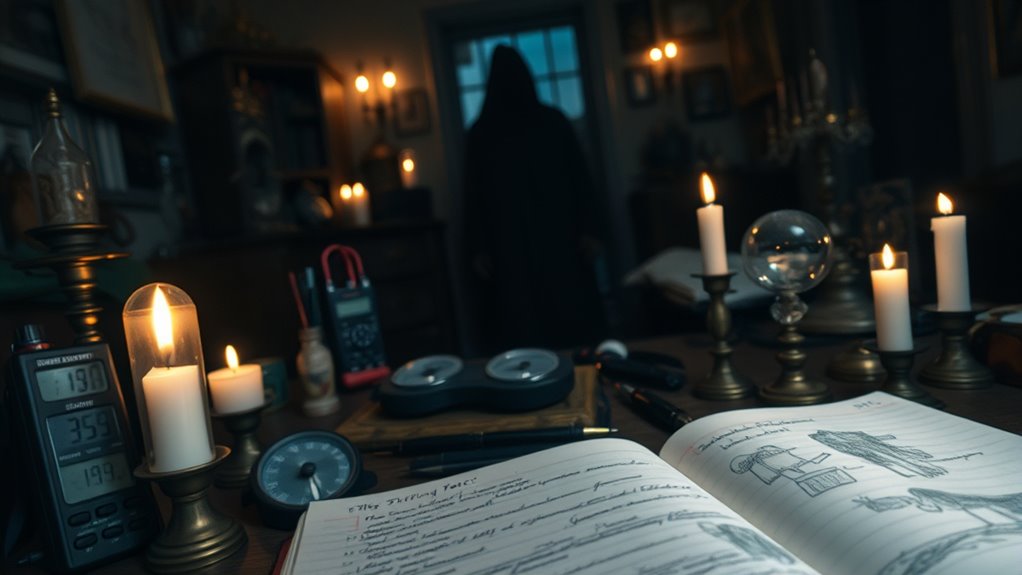
Why would you want to pursue a career in paranormal research? This field allows you to explore the mysteries of unexplained phenomena and communicate with spirits in ways that challenge conventional understanding.
You’ll have the chance to investigate historical locations with rich emotional and tragic backstories, enhancing your personal and professional experiences.
As a paranormal researcher, you’ll use specialized equipment like EMF meters and EVP recorders to gather and analyze evidence of potential paranormal activity.
Approaching your work with skepticism is essential, as you’ll need to differentiate between natural explanations and true paranormal occurrences.
With the growing interest in the paranormal, fueled by technology and media, this career path offers exciting opportunities for engagement and collaboration.
How to Interpret Signs From the Deceased?

Exploring the domain of paranormal research often leads to profound questions about life, death, and the connections we maintain with those who’ve passed.
When interpreting signs from the deceased, pay attention to specific objects that appear unexpectedly, especially around significant dates. Dreams featuring the deceased can provide comforting messages, reflecting your emotional state.
You might notice unexplained phenomena, like flickering lights or familiar songs playing, reminding you of their presence. Additionally, feelings of warmth or chills in familiar places could indicate a spiritual presence.
Ultimately, coincidences—like seeing their name or images in unexpected places—can be powerful signs. Trust your intuition; the connections you feel are likely real, serving as reminders that they’re still with you.
Frequently Asked Questions
What Are Good Questions to Ask Spirits?
When you want to communicate with spirits, ask open-ended questions to encourage detailed responses.
Try “What’s your name?” or “What was your life like?” to gain insights into their past. You can also inquire, “Why are you here?” to understand their intentions.
Asking for guidance, like “Do you have any advice for me?” can lead to meaningful connections.
Don’t forget to ask about specific memories or places, such as “What do you think of this place?”
What Makes Something Paranormal?
When you think of paranormal activity, it often feels like a mind-bending rollercoaster of the bizarre!
Something’s considered paranormal when it defies normal scientific explanations, often linked to supernatural forces. You might experience strange sensations or hear unexplained sounds, prompting your brain to jump to conclusions.
Psychological factors like fear can heighten these perceptions. Always approach these experiences with a healthy dose of skepticism, seeking natural causes before diving into the supernatural domain.
What’s the Difference Between Paranormal and Supernatural?
The difference between paranormal and supernatural lies in their nature and investigation.
You’ll find paranormal phenomena, like ghost sightings and UFOs, can often be observed and researched.
In contrast, the supernatural involves deities and spiritual beliefs, which aren’t testable through scientific methods.
While both deal with the unknown, paranormal activities invite exploration, whereas supernatural claims rely heavily on faith and personal belief systems, making them less accessible to empirical inquiry.
What Is the Meaning of Paranormal Activity?
Paranormal activity refers to occurrences that go beyond normal experiences, often defying scientific explanations. You might sense a chill, hear unexplained sounds, or feel like you’re not alone.
These sensations can be subjective, as your brain might misinterpret what you’re experiencing. While many reports lack concrete evidence, exploring these phenomena can lead to both intriguing insights and misconceptions.
Conclusion
In exploring the mysteries of the paranormal, you might find that the truth often lies somewhere between belief and skepticism. Whether you’re drawn to the thrill of investigating ghostly encounters or simply curious about signs from the deceased, remember to approach it with an open mind. While some experiences can be unsettling, they can also offer profound insights. Ultimately, your journey into the unknown can reveal not just the mysteries of the afterlife, but also a deeper understanding of yourself.
